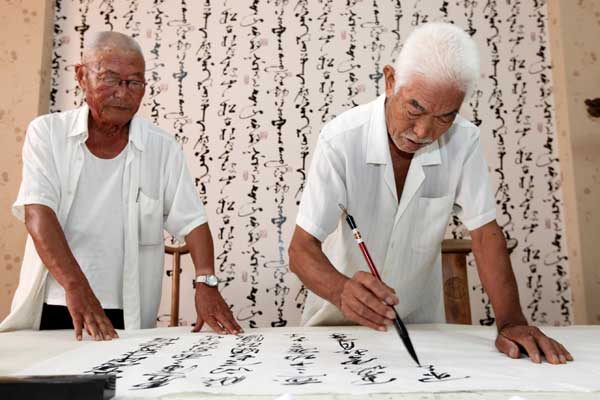Private sector to care for the elderly
|
 Yu Jinyun, 78, practices calligraphy at a daily care center in Zaozhuang, Shandong province, on Thursday. Ji Zhe / for China Daily |
New policy will see government taking a back seat on aid for seniors
The Chinese government will make major policy adjustments to enable the private sector to play a leading role in providing services for its rapidly aging population, said a senior official from the Ministry of Civil Affairs.
Dou Yupei, vice-minister of civil affairs, said the government should gradually step back from the role of service provider. Meanwhile, it will encourage social investors' participation in the sector.
Measures include providing financial incentives and allowing private investors to rent public institutions once they have been dedicated to elderly care services. "The government should prioritize providing care services for vulnerable senior citizens,w including those impoverished, disabled and childless," he told officials from local government civil affairs departments at a meeting on elderly care services in Ulanqab, Inner Mongolia on Sunday.
Dou said elderly care services include nursing, insurance, education, fitness and tourism.
"The government should actively cultivate the market, encourage and guide different social investors to participate in the development of elderly care services, enable the market to play a fundamental role in allocating resources and let social actors take leading roles," he said.
China has the world's largest elderly population, as the number of citizens older than 60 reached 194 million by the end of 2012, and is expected to exceed 300 million by 2050.
The government urgently needs to channel private capital to meet the soaring demand for elderly care services, Dou said.
As of the end of 2012, only 41 percent of urban communities were capable of providing care services for the elderly, while in rural areas that number was just 16 percent, according to the Ministry of Civil Affairs.
Homes for the elderly can only provide about 4.3 million beds nationwide, or about 22 beds for every 1,000 senior citizens. The government aims to provide 30 beds for every 1,000 senior citizens by the end of 2015.
Around 23 billion yuan ($3.8 billion) in private capital has been invested in the elderly care industry since 2011, the ministry said.
Civil affairs authorities plan to strengthen their management of commercial organizations in the elderly care market and change current practices that simply focus on the administrative licensing and supervision of nonprofit organizations in the sector.
Dou said the government will simplify the registration process for individuals and organizations dedicated to providing care services for the elderly.
Dou also urged local governments to beef up supervision of nursing staff, fire and food safety, and fees and charges for services.
The government will also speed up the development of elderly care services in rural areas, Dou said.
To ensure that 50 percent of rural communities have daytime care centers by the end of 2015, the central government will allocate 3 billion yuan in welfare lottery revenue from 2013 to 2015 for construction projects, he added.
The moves are part of a group of new directives to boost the development of elderly care services that the State Council, or China's cabinet, will release later this year.
Xu Yongguang, who specializes in aging studies and also the vice-president of Narada Foundation, a charitable foundation in Beijing, said less than 10 percent of privately run elderly homes make a profit.
"It is important for the government to implement the incentive policies to facilitate private investment in elderly care services and create a fair environment for competition in this fledging sector," he said.
Zhu Longying, director of Jiangsu Civil Affairs Bureau's department of social welfare, agreed that the government should provide necessary help for those startups and guide the investment to the most urgent fields, such as nursing care for disabled elderly people.


















